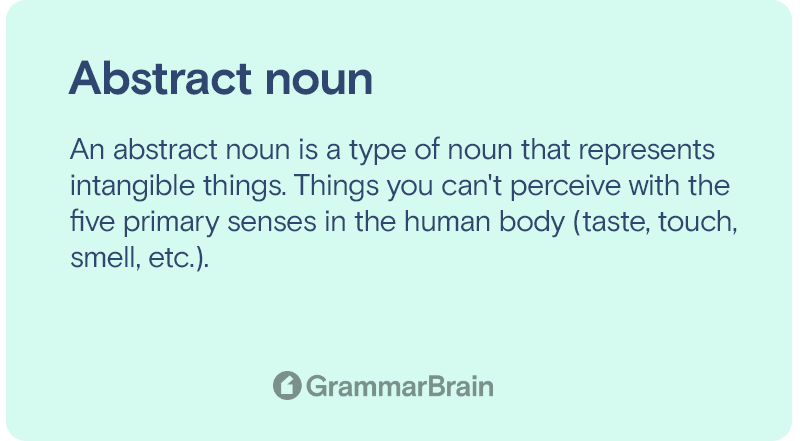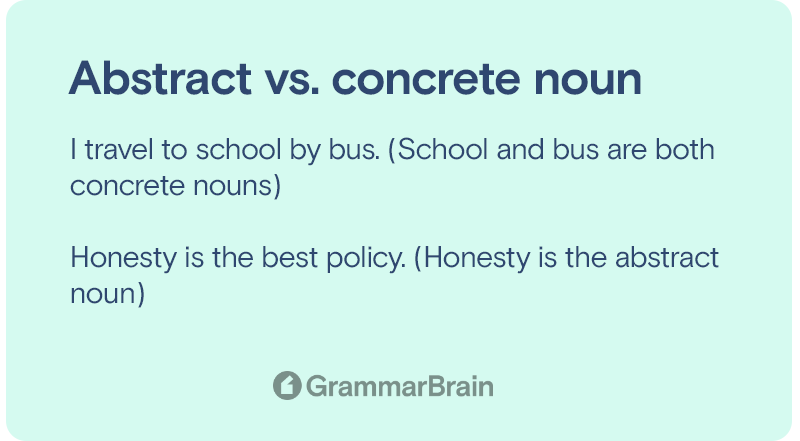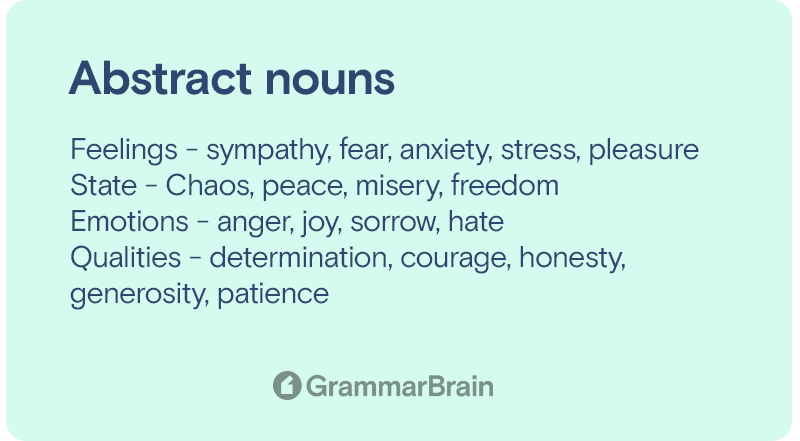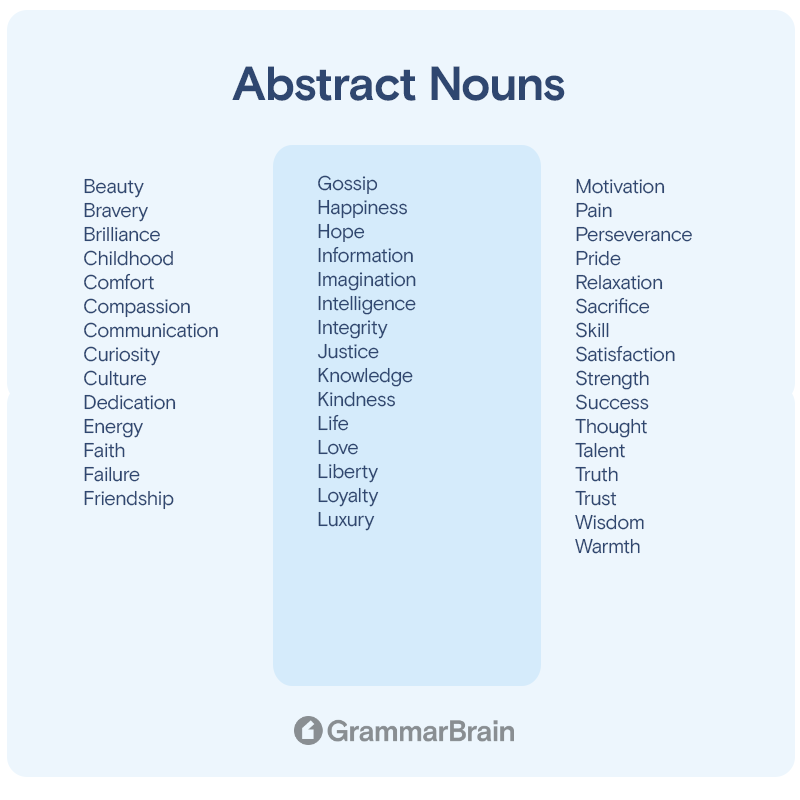What is an abstract noun? How is it different from a common noun? What are words that represent an abstract noun? These are all great questions that you probably have. Abstract nouns can get confusing when comparing them to regular common nouns or proper nouns. This comprehensive guide will break down the abstract noun, its use, and the functions that grammatically govern it.

What is an abstract noun?
An abstract noun is a type of noun that represents intangible things. Things you can’t perceive with the five primary senses in the human body (taste, touch, smell, etc.).
Abstract noun definition
As the name suggests, an abstract noun is a noun type. It refers to an intangible idea (one that you cannot fathom using your five senses). Such intangible concepts could include emotions, qualities, ideas, etc.
All nouns that do not have a tangible or physical object to refer to fall under the bracket of abstract nouns. Abstract nouns are widely used in English proverbs.
Some common examples include health, wealth, parenthood, anger, courage, and more.
Abstract noun compared to other nouns
Nouns are an essential part of speech. They are instrumental in naming places, people, objects, animals, and intangible ideas.
You may have noticed that whenever you write a sentence, you are using at least one noun in it.
Nouns can get used differently in different sentence formations. Their functions can vary. Here are the main types of nouns you could use in a complete sentence:
Proper Nouns
Proper nouns are naming agents for places, people, or things. They usually start with a capital letter.
For example:
- My name is Lisa. (Lisa is the proper noun)
- John lives in Finland. (Finland is the proper noun)
- Jazz is a famous book. (Jazz is the proper noun)
Common Nouns
Nouns that refer to generic things are referred to as common nouns.
For example:
- I bought a new book yesterday. (Book is the common noun)
- There is a pigeon on the windowsill. (Pigeon is the common noun)
- Rob bought a blue car. (Car is the common noun)
Countable Nouns
Nouns that can be measured or counted are called countable nouns.
For example:
- I take two spoons of sugar in my tea. (“Two” is the countable noun)
- She bought a dozen bananas at the market. (“A dozen” is the countable noun)
Uncountable Nouns
Nouns that cannot be measured or counted are called uncountable nouns.
For example:
- I have plenty of homework. (Plenty is the uncountable noun)
- Is that enough milk in your coffee? (Enough is the uncountable noun)
Collective Nouns
Collective nouns depict a group of objects, people, animals, and more.
For example:
- A flock of sheep
- A pile of books
- A school of fish
- A bevy of women
Concrete Nouns
Also referred to as material nouns, concrete nouns refer to things that have a physical presence and can be perceived using the five senses.
Abstract Nouns
Any noun that is intangible or which cannot be perceived using the five senses is an abstract noun.
For example:
- Bravery is a virtue. (Bravery is the abstract noun)
- My childhood was merry and fun. (Childhood is the abstract noun)

Abstract nouns in comparison to concrete nouns
Concrete noun, as the name suggests, includes all those objects which have a physical presence and are tangible. They can be perceived with the help of our five senses. These include nouns such as book, pen, cup, table silk, door, car, and so on.
For example:
- I travel to school by bus. (School and bus are both concrete nouns)
- Sally opened the door. (Door is the concrete noun)
Abstract nouns include everything that is intangible and cannot be perceived by the five senses. These include emotions, feelings, ideas, and more.
For example:
- Honesty is the best policy. (Honesty is the abstract noun)
- Freedom is my birthright. (Freedom is the abstract noun)

Abstract noun word list
Here are some examples of abstract nouns based on their kind.
- Feelings – sympathy, fear, anxiety, stress, pleasure
- State – Chaos, peace, misery, freedom
- Emotions – anger, joy, sorrow, hate
- Qualities – determination, courage, honesty, generosity, patience
- Concepts – democracy, charity, deceit, opportunity, comfort
- Moments – career, death, marriage, childhood, birth

More examples of commonly used abstract nouns
- Beauty
- Bravery
- Brilliance
- Childhood
- Comfort
- Compassion
- Communication
- Curiosity
- Culture
- Dedication
- Energy
- Faith
- Failure
- Friendship
- Gossip
- Happiness
- Hope
- Information
- Imagination
- Intelligence
- Integrity
- Justice
- Knowledge
- Kindness
- Life
- Love
- Liberty
- Loyalty
- Luxury
- Motivation
- Pain
- Perseverance
- Pride
- Relaxation
- Sacrifice
- Skill
- Satisfaction
- Strength
- Success
- Thought
- Talent
- Truth
- Trust
- Wisdom
- Warmth
Sentence examples with abstract nouns
The following are three sentence examples with abstract nouns –
- This cafe has a pleasant ambiance. (Ambiance is the abstract noun)
- Pride is a deadly sin. (Pride is the abstract noun)
- My friendship with Peter is of seven years. (Friendship is the abstract noun)
Conversion of Verbs and Adjectives into Abstract Nouns
Convert verbs and adjectives into abstract nouns by adding a suffix. The reverse is also a possibility.
For example:
- Perceive – Perception
- Inform – Information
- Determine – Determination
- Dark – Darkness
- Silent – Silence
Why are abstract nouns important?
Abstract nouns are tricky. Use concrete nouns to make them understandable in sentences. Abstract nouns are not of much use from a business point of view.
However, they are an integral part of any English grammar course. Conversions between abstract nouns and verbs or adjectives are essential while learning complete sentence construction.
FAQs
Is “warmth” an abstract noun?
Yes, warmth is an abstract noun.
What is the adjective form of “ability” as an abstract noun?
The abstract form of ability (abstract noun) is able.
What are five examples of abstract nouns?
Five examples of abstract nouns include honesty, glory, patience, determination, and truth.
Inside this article
Fact checked:
Content is rigorously reviewed by a team of qualified and experienced fact checkers. Fact checkers review articles for factual accuracy, relevance, and timeliness. Learn more.
Core lessons
Glossary
- Abstract Noun
- Accusative Case
- Anecdote
- Antonym
- Active Sentence
- Adverb
- Adjective
- Allegory
- Alliteration
- Adjective Clause
- Adjective Phrase
- Ampersand
- Anastrophe
- Adverbial Clause
- Appositive Phrase
- Clause
- Compound Adjective
- Complex Sentence
- Compound Words
- Compound Predicate
- Common Noun
- Comparative Adjective
- Comparative and Superlative
- Compound Noun
- Compound Subject
- Compound Sentence
- Copular Verb
- Collective Noun
- Colloquialism
- Conciseness
- Consonance
- Conditional
- Concrete Noun
- Conjunction
- Conjugation
- Conditional Sentence
- Comma Splice
- Correlative Conjunction
- Coordinating Conjunction
- Coordinate Adjective
- Cumulative Adjective
- Dative Case
- Determiner
- Declarative Sentence
- Declarative Statement
- Direct Object Pronoun
- Direct Object
- Diction
- Diphthong
- Dangling Modifier
- Demonstrative Pronoun
- Demonstrative Adjective
- Direct Characterization
- Definite Article
- Doublespeak
- False Dilemma Fallacy
- Future Perfect Progressive
- Future Simple
- Future Perfect Continuous
- Future Perfect
- First Conditional
- Irregular Adjective
- Irregular Verb
- Imperative Sentence
- Indefinite Article
- Intransitive Verb
- Introductory Phrase
- Indefinite Pronoun
- Indirect Characterization
- Interrogative Sentence
- Intensive Pronoun
- Inanimate Object
- Indefinite Tense
- Infinitive Phrase
- Interjection
- Intensifier
- Infinitive
- Indicative Mood
- Participle
- Parallelism
- Prepositional Phrase
- Past Simple Tense
- Past Continuous Tense
- Past Perfect Tense
- Past Progressive Tense
- Present Simple Tense
- Present Perfect Tense
- Personal Pronoun
- Personification
- Persuasive Writing
- Parallel Structure
- Phrasal Verb
- Predicate Adjective
- Predicate Nominative
- Phonetic Language
- Plural Noun
- Punctuation
- Punctuation Marks
- Preposition
- Preposition of Place
- Parts of Speech
- Possessive Adjective
- Possessive Determiner
- Possessive Case
- Possessive Noun
- Proper Adjective
- Proper Noun
- Present Participle
- Prefix
- Predicate



